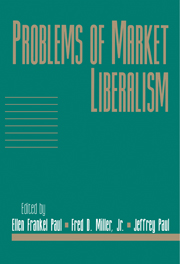Book contents
- Frontmatter
- Contents
- Introduction
- Acknowledgments
- Contributors
- Why All Welfare States (Including Laissez-Faire Ones) Are Unreasonable
- Measuring Opportunity: Toward a Contractarian Measure of Individual Interest
- Deontic Restrictions Are Not Agent-Relative Restrictions
- Why Even Egalitarians Should Favor Market Health Insurance
- Affirmative Action and the Demands of Justice
- The Dual Role of Property Rights in Protecting Broadcast Speech
- Regulation of Foods and Drugs and Libertarian Ideals: Perspectives of a Fellow-Traveler
- Profit: The Concept and Its Moral Features
- Natural Property Rights: Where They Fail
- Toward a Libertarian Theory of Class
- Libertarianism as if (the Other 99 Percent of) People Mattered
- On the Failure of Libertarianism to Capture the Popular Imagination
- Imitations of Libertarian Thought
- Index
Affirmative Action and the Demands of Justice
Published online by Cambridge University Press: 26 January 2010
- Frontmatter
- Contents
- Introduction
- Acknowledgments
- Contributors
- Why All Welfare States (Including Laissez-Faire Ones) Are Unreasonable
- Measuring Opportunity: Toward a Contractarian Measure of Individual Interest
- Deontic Restrictions Are Not Agent-Relative Restrictions
- Why Even Egalitarians Should Favor Market Health Insurance
- Affirmative Action and the Demands of Justice
- The Dual Role of Property Rights in Protecting Broadcast Speech
- Regulation of Foods and Drugs and Libertarian Ideals: Perspectives of a Fellow-Traveler
- Profit: The Concept and Its Moral Features
- Natural Property Rights: Where They Fail
- Toward a Libertarian Theory of Class
- Libertarianism as if (the Other 99 Percent of) People Mattered
- On the Failure of Libertarianism to Capture the Popular Imagination
- Imitations of Libertarian Thought
- Index
Summary
This essay is about the moral and political justification of affirmative action programs in the United States. Both legally and politically, many of these programs are under attack, though they remain ubiquitous. The concern of this essay, however, is not with what the law says but with what it should say. The main argument advanced in this essay concludes that most of the controversial affirmative action programs are unjustified. It proceeds in a way that avoids dependence on controversial theories of justice or morality. My intention is to produce an argument that is persuasive across a broad ideological spectrum, extending even to those who believe that justice requires these very programs. Though the main focus of the essay is on affirmative action, in the course of making the case that these programs are illegitimate, I shall defend some principles about the conditions under which it is appropriate for the state to impose on civil society the demands of justice. These principles have broader implications for a normative theory of social change in democratic societies.
AFFIRMATIVE ACTION PROGRAMS
Affirmative action programs exist in a variety of institutional settings. They can be found as a part of the policies that govern hiring, promotion, and retention (in both the public and private sectors); the awarding of contracts; and admissions to training programs, universities, and professional schools. All such programs can be classified in two broad categories, what can be called “outreach efforts” and “preferential treatment programs.”
- Type
- Chapter
- Information
- Problems of Market Liberalism , pp. 133 - 175Publisher: Cambridge University PressPrint publication year: 1998

